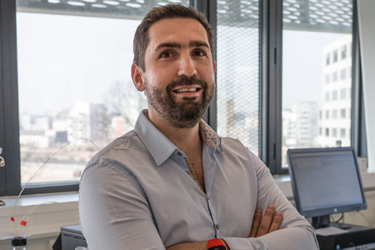Companies To Watch: OSE Immunotherapeutics

By Ben Comer, Chief Editor, Life Science Leader

Designing medicines and vaccines to combat immune system deficiencies and disfunction across numerous conditions.
Snapshot
OSE Immunotherapeutics is on the cusp of beginning a three-year, 350 patient Phase 3 confirmatory and pivotal study in support of Tedopi, a novel cancer vaccine targeting second-line patients with non-small cell lung cancer (NSCLC) who don’t benefit from treatment with chemotherapy and a checkpoint inhibitor. The French company is developing a companion diagnostic that identifies NSCLC patients with HLA-A2 serotypes, which account for roughly 45% of the patient population. HLA-A2 patients have a higher likelihood of responding to Tedopi, since the vaccine antigens have been engineered for this population. OSE Immunotherapeutics has two additional internal clinical candidates, and three externally partnered clinical candidates, plus a preclinical deal with AbbVie for OSE-230 — a monoclonal antibody targeting chronic inflammation — worth over $700 million in front end milestones, plus royalties on future sales revenue.
What’s At Stake
With FDA’s blessing of the protocol, and financing secured to cover the three-year Phase 3 Tedopi trial, Nicolas Poirier, CEO at OSE Immunotherapeutics, is gunning for a 2027 registration of the first therapeutic cancer vaccine for NSCLC patients. Poirier’s excitement about the Phase 3 trial is heightened by the fact that Moderna and Merck also launched a Phase 3 trial for their cancer vaccine in July of 2024, with some important differences. “We know that Moderna is strong, and fast, and really good [at clinical development], but their study is in melanoma, and it’s a six-year study,” notes Poirier. “Our study will take three years, and if we succeed, we will be the first to register.”
Patients that fail the first line of therapy in NSCLC — chemotherapy and a checkpoint inhibitor — currently have very few options; nothing is approved specifically for that population. Ongoing treatment with chemotherapy is unpleasant regarding side effects, and is largely ineffective in prolonging life or slowing tumor growth. In a Phase 3 trial (ATALANTE-1) that was ended prematurely during COVID, due to increased risks for patients that had received chemotherapy, Tedopi showed improvement over chemotherapy in terms of overall survival and safety. The forthcoming Phase 3 trial will attempt to confirm those benefits with more patients and better segmentation.
The opportunity is significant. The eligible population for Tedopi, using the companion diagnostic (developed in collaboration with GenDx), is roughly 100,000 new patients per year in the U.S. and Europe, says Poirier. The global NSCLC market is forecast to be worth nearly $39 billion by 2030. OSE Immunotherapeutics is also in the early stages of development with its own PD-1 checkpoint inhibitor (OSE-279), which could be used as a monotherapy for certain rare cancers, or as part of an internal combination therapy. “If we want to go into the first line in lung cancer — where the patient population is bigger, where the medical need is also important, and where the immune system is better for [receiving a] vaccination — we will need to combine [Tedopi] with an anti-PD-1,” says Poirier. “And we wanted to be able to do that for free.”
OSE Immunotherapeutics is pursuing a two-pronged strategy, the first of which is to continue progressing its internal candidates, Tedopi, as well as Lusvertikimab (OSE-127), an IL-7R antagonist currently in Phase 2 for ulcerative colitis, and OSE-279, the anti-PD-1 drug mentioned above. The second part of the strategy is to continue out-licensing research programs, particularly with drugs that have the potential to treat several different indications. Developing those products internally would require “a very large investment … it’s better to license those programs to large pharma companies because it allows us to reinvest in our primary programs, while also helping to validate our science and technology,” says Poirier.
In February, AbbVie became OSE Immunotherapeutics’ most recent partner, paying $48 million up-front, plus up to an additional $665 million in milestone payments, for OSE-230, a preclinical monoclonal antibody designed to “resolve” chronic and server inflammation. It’s unusual as of late for a company to receive such a sizeable up-front for a preclinical asset. Poirier says the deal reflects growing interest in the “resolution of inflammation” field, of which Charles Serhan, a member of OSE Immunotherapeutics’ scientific advisory board, is a leading figure. “After 10 years of academic research, we were the first company to develop a drug candidate … we are pioneering this field,” says Poirier. The company has additional partnerships with Boehringer Ingelheim in oncology, and Veloxis Pharmaceuticals in kidney transplant.
OSE Immunotherapeutics was created through the merger of OSE Pharma and Effimune in 2016. Poirier holds a Ph.D. in immunology, and joined Effimune as a scientist, and the company’s second employee, in 2009. After “15 years of very intense research,” Poirier climbed into the top role at OSE Immunotherapeutics in 2022. Results with Lusvertikimab (OSE-127), the company’s Phase 2 ulcerative colitis drug, are expected to read out in mid-2024.
Vital Statistics
Employees: 60
Headquarters: Nante, France
Funding: €180 million received, eligible for €2.1billion in milestones.
Latest Updates:
April 2024: Received €8.4 million from the French government to support the Phase 3 trial of Tedopi
March 2024: Completed enrollment of Phase 2 trial of Lusvertikimab in ulcerative colitis
